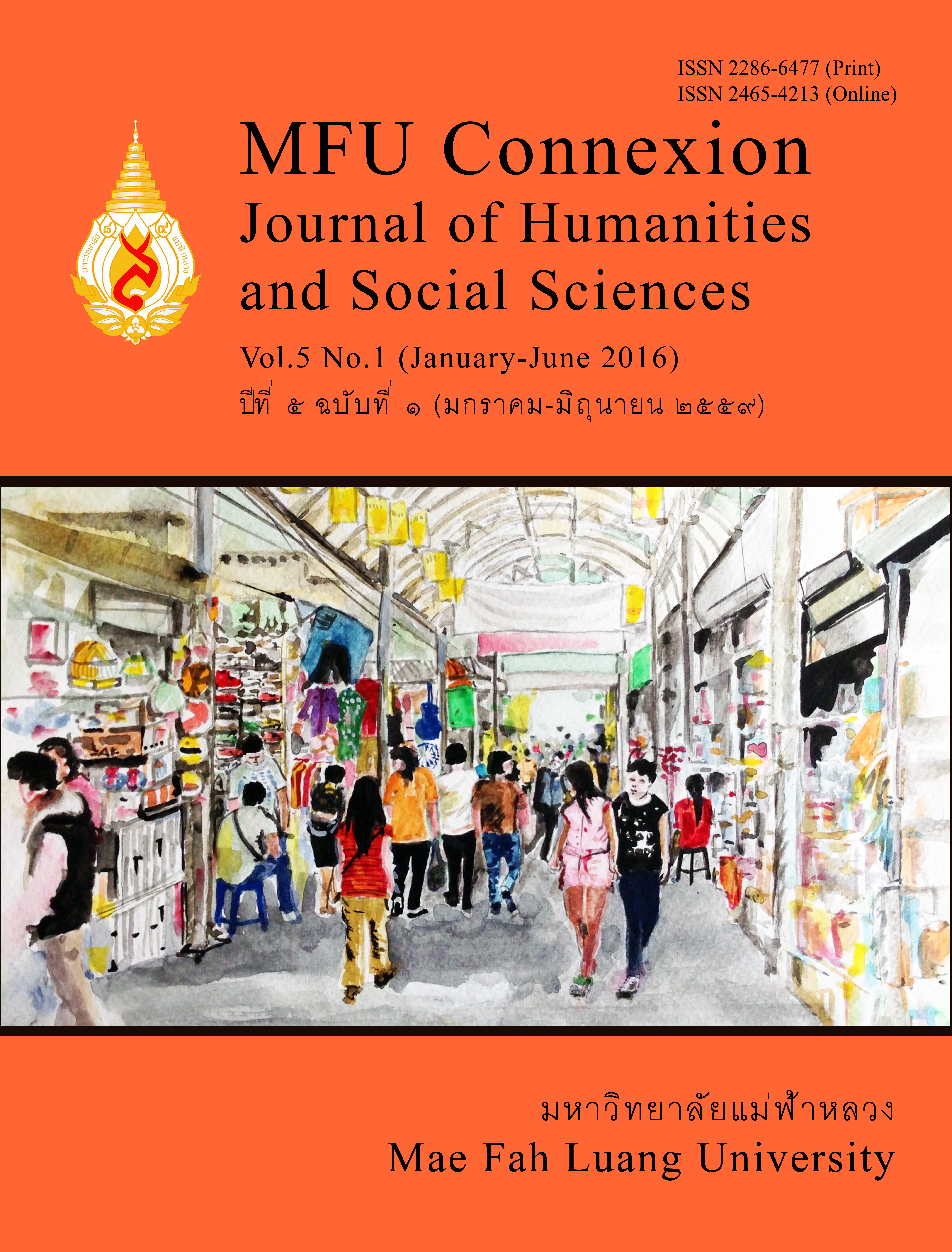แนวคิดในการศึกษาอัตลักษณ์ทางดนตรี
Main Article Content
Abstract
This study was aimed at introducing the ideology of musical identity, another form of an identity study recently emerging in the field of social science over the past two decades. Musical identity was termed as an idea developed by the identity conceptualization in connection with musical phenomena rising in the global communities. The integration between the ideas of identifying features and music led to a realization that not only did man create music for the sake of occasional entertainment, but also allow it to acquire a major role in discovering and building self. The perception of self-existence proved man’s life to be meaningful, confident, and proud to live with other community members. Musical identity connected individuals to society meanwhile individuals exhibited their musical identity to have interaction with others in the society. However, musical identity was no creation that lasted consistently. Relevant changes emerged according to the course of time and space. Musical identity was recognized once it originated, occupied, and changed over. The world at the present time was obsessed with globalization and capitalization, causing rapid changes in cultures and societies. The changes prompted people’s effort in maintaining their identities as well as creating a new identity to cope with the changing society. Technology- oriented globalization had generated musical integrations among people from different cultural backgrounds, initiating newly-blended genres or contemporary music. The rising of contemporary music allowed people to experience music differently and brought about brand new aesthetic benchmark. The contemporary music phenomena were reflecting the process of musical identity in the changing global community.
Article Details
Copyright
Connexion: Journal of Humanities and Social Sciences has an exclusive right to publish the accepted articles in any form. However, the author retains the following rights:
1. The right to the ownership of the article;
2. The right to use all or part of the article in his/her other works;
3. The right to re-produce the article for personal use or for use in the author’s organisation, in which case the author must obtain permission from Connexion: Journal of Humanities and Social Sciences;
4. The right to make copies of all or part of the work for educational use or for the author’s use in classroom teaching; and
5. The right to include the work (both the preprinted and printed versions) in an institutional repository.
References
ขำคม พรประสิทธิ์. (2546) อัตลักษณ์ของเพลงฉิ่ง: รายงานวิจัย, กรุงเทพฯ: จุฬาลงกรณ์มหาวิทยาลัย.
ฐิตินันท์ คอมมอน. (2555) เพลงและอัตลักษณ์วัฒนธรรมชุมชน: จรัล มโนเพ็ชร กับบทบาทของนักรบทางวัฒนธรรมดนตรีล้านนา, วารสารนิเทศศาสตร์ธุรกิจบัณฑิต, ปีที่ 6 ฉบับที่ 2, 145-179.
ณรงค์ชัย ปิฎกรัชต์. (2556) ดนตรีในงานประเพณีปอยหลวงที่วัดสันดอนมูล, วารสารเพลงดนตรี, ปีที่ 11, 12-18.
ปถมา เอี่ยมสะอาด. (2539) กระจับปี่: การศึกษาด้านวัฒนธรรมและอัตลักษณ์ทางดนตรี, วิทยานิพนธ์ ศิลปศาสตรมหาบัณฑิต สาขาวัฒนธรรมศึกษา, บัณฑิตวิทยาลัย มหาวิทยาลัยมหิดล.
วิริยะ สว่างโชติ. (2549) ดนตรีบนหนทางวัฒนธรรมศึกษา, กรุงเทพฯ: จรัลสนิทวงศ์การพิมพ์.
อภิญญา เฟื่องฟูสกุล. (2543) อัตลักษณ์ (Identity): การทบทวนทฤษฎีและกรอบแนวคิด: รายงานวิจัย, กรุงเทพฯ: สำนักงานสภาวิจัยแห่งชาติ สาขาสังคมวิทยา.
Brubaker, R. & Cooper, K. (2000) ‘Beyond Identity’, in Theory and society, (pp. 1-47). Netherland: Academic Publishers.
Frith, S. (1996) ‘Music and identity’, in Questions of cultural identity, London: Sage Publication.
Hargreaves, J. D., Miell, D. & Macdonald, R. (2002) ‘What are musical identities, and Why are they importance?’, in Musical identities, New York: Oxford University Press.
Hudson, R. (2006) Region and place: Music, identity, and place, Progress in Human Geography, vol. 30, no. 5, pp. 626-634.
Kriangsak Chetpatanavanich. (2007) Constructing the third identities through modern northern country songs (Pleng Luk Thung Kum Mueang): A social history of modernity in rural Chiang Mai. Doctoral Dissertation. Chiang Mai University.
Lena, J. & Peterson, R. (2008) Classification as culture: Types and trajectories of music genres, American Sociological Review, vol. 73, no. 5, pp. 697-718.
Macdonald, R., Hargreaves, J. D. & Miell, D. (2002) Musical identities, New York: Oxford University Press.
Ronstrom, O. (2006, May 12-14) Emergent musical identities in Sweden: folk music between “tradition” and “heritage”, in Emerging Musical Identities: Views from Across the Atlantic, Wesleyan University.
Stokes, M. (2004) Music and the Global Order, Annual Review of Anthropology, vol. 33, pp. 47-72.
Stryker, S. & Burke, K. P. (2000) The past, present and future of identity theory, Sociology Phycology Quarterly, vol. 63, no. 4, pp. 224-237.
Vignoles, L. V., Schwartz, J. S. & Luyckx, K. (2011) ‘Introduction: Toward integrative view of identity’, in Handbook of identity theory and research (pp. 1-27), New York: Springer.


